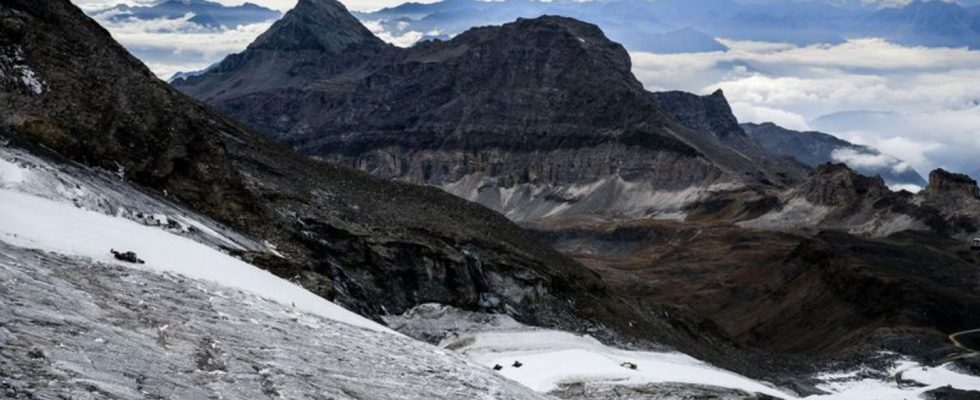Alpine skiing
Ski spectacle on the Matterhorn with starting difficulties
There is a lot of discussion about the races on the Matterhorn. photo
© Jean-Christophe Bott/KEYSTONE/dpa
Even before its premiere, the new departure from Zermatt to Cervinia is causing a stir. Sport disappears behind environmental and scheduling discussions. Will snow and wind also become a problem?
The alpine ski stars will plunge down the “Gran Becca” at an expected speed of 135 kilometers per hour. The new descent on the Matterhorn should be a spectacle. The start at around 3,800 meters is the highest in the World Cup. The route is over 3.7 kilometers Zermatt in Switzerland to Cervinia in Italy is the first to go through two countries.
But the new prestigious project of the World Ski Association Fis not only starts a year later than planned, but is also accompanied by huge discussions. About the climate, about sustainability, about the racing calendar – it’s about a lot again, but – as is so often the case these days – hardly about the sport itself. The expected fresh snow and wind may be putting a damper on the organizers’ plans until the weekend anyway . Last season the premiere was canceled because there wasn’t enough snow. From a PR perspective, another cancellation would be a fiasco.
Before the men’s races planned for Saturday and Sunday, Wolfgang Maier, the alpine director of the German Ski Association (DSV), makes it clear that he would now like to concentrate on his core business. The recurring questions about the circumstances will come up sooner or later anyway. Quite a few protagonists in the Alpine ski scene have long felt like they are pawns – things go back and forth between climate activists, conservationists, politicians, tourism associations and, last but not least, their own world association. The glaciers are melting and winter sports are increasingly coming under the microscope.
Controversial dredging work
The new races on the Matterhorn would show that the local government continues to give priority to tourism development over the preservation of our environment, as in the 20th century, the Greens of the canton of Valais recently complained. Images of dredging work on the Theodul glacier caused outrage. Greenpeace Switzerland and other nature conservation organizations expressed the suspicion that some of the work was taking place outside the approved sports zone. The canton’s building commission stopped the work.
A small part of the originally planned slope was outside the zone permitted for skiing. The organizers corrected the route and apologized. “If we have moved slightly beyond the border, then – again – we apologize, it was never our intention,” said organization boss Franz Julen on Swiss television.
For Julen, the Matterhorn descent is “one of the most sustainable ski races ever”. He argues that 95 percent of the slope area already exists. Most of the riding takes place on glaciers and natural snow. And there are already existing systems for the artificial snow required. “If you compare what’s happening in the world today with the climate, then we take three large machines and prepare a glacier for three weeks,” explains Julen. If you put that in relation “to the social and economic factors that go into it,” he believes, “this work is responsible.”
Ski tourism should be boosted
But the date of the races is also controversial. A week after the men, it’s the women’s turn. Many people ask themselves why in November and not in late winter. In Zermatt itself, however, there seems to be no more interest in relocating the event than in Sölden, where the season opened on the last weekend in October. The aim of the World Cup races is to boost ski tourism in both regions.
Be it DSV Alpine boss Maier or Germany’s top downhill skier Thomas Dreßen: Hardly any of those who are actually at stake would have anything against the season starting later. Even Fis President Johan Eliasch recently surprisingly called for the start in Sölden to be pushed back even further. Which is not possible in the current calendar because of the new Matterhorn races. The situation is tricky. And sport continues to be a minor matter.

